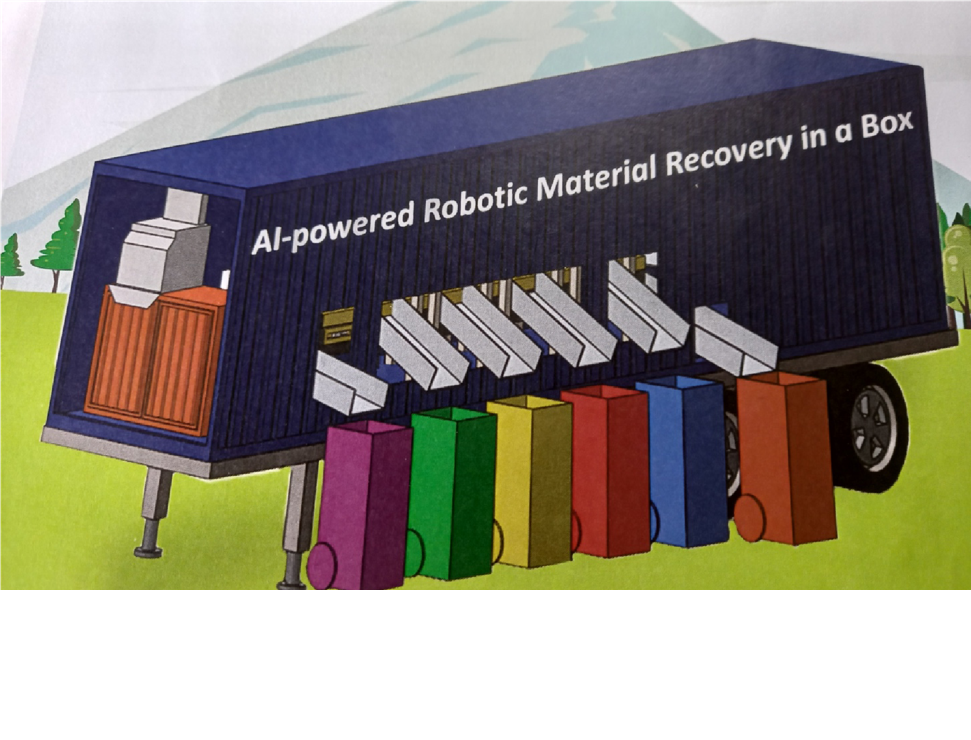Where do we stand with waste management? An introduction to the background of the project RECLAIM.
RECLAIM MEETS THE SPECIAL NEEDS OF THE IONIAN ISLANDS
In this article we describe the current situation, the future and the role that RECLAIM can play in modern waste management.

Introduction
The recovery of recyclable materials is a key element of the Circular Economy and the Green Deal. Large scale separation installations play an important role in this. They are a perfect solution for urban areas with a modern infrastructure. But these installations are not possible everywhere. The development of a portable, robotic Material Recovery Facility (prMRF) will facilitate material recovery in remote areas, where large numbers of tourists cause enormous seasonal peaks in waste. A small scale, innovative solution is now under construction: RECLAIM.
The bigger picture
When Greece joined the EU in the early 1980s, the country was (as it still is) faced with a huge task in waste management. For a long time, the country was not able to comply with the strict EU landfill guidelines. After national legislation and regional plans were implemented, waste management accelerated and resulted in the diversion of biodegradable municipal waste from landfills and the collection of commingled recycles (plastic, metals, paper and cardboard). The
program for these commingled recyclables, originally driven by HERRCO SA, one of the partners in the RECLAIM project, received wide acclaim across the country.
Acceleration is needed
Materials Recycling Facilities were built across Greece. This was a huge step forwards, that led to the targeted 50% recycling in 2020. Although significant progress has been made towards sustainable waste management, Greece will need – as almost other European countries – to accelerate prevention, reuse, recycling and energy production in order to match
the EU Green Deal and boost the circular economy. ‘We need all these drivers in order to radically change waste management into a more sustainable direction,’ says Nikos Vithoulkas, representative of the Waste Management Authority of the Ionian Islands Region.
Similar goals
Looking at the vision and strategy of the Waste Management Authority of the Ionian Islands, you can see how much effort has been put into recyclable materials sorting centers, waste and recyclable material transfers stations and mechanical and biological waste treatment units. Landfill still exists, but the transition to sustainable management is underway. Sorting at source is focused on a broad range of waste: biowaste, edible fats and oils, separate collection of packaging materials, aluminum, bulky waste, electronics, textiles, batteries and hazardous household waste. The targets for reuse (60% by 2030) and recycle (70% by 2030) are comparable to other EU countries. The same holds true for other actions, such as composting equipment, communication, uniform color and type of bins and the promotion of creative material reuse centers (KDEY). The use of landfills will be minimized to <10% by 2030.
The challenge
So, there is a lot of work to be done. But there is also another challenge. Therefore, we need to zoom in on the targeted RECLAIM location, Kefalonia or Kefallinia, an island in the Ionian Sea, belonging to the Ionian Islands. ‘It is the sixth largest island in Greece after Crete, Evia, Lesbos, Rhodes and Chios as well as the largest island of the Ionian Sea,’ explains Nikos, who is closely involved in the RECLAIM project. ‘The population of Kefalonia amounts to 35,801 inhabitants. But, according to data from the competent bodies of the Municipalities of Kefalonia and data from the available tourist accommodation on the island, the population served shows strong seasonal variation. During the summer months, due to an increase in tourist flows, it more than doubles and exceeds 80,000 inhabitants during the peak season including marine tourism. There are also years when the served population, during the peak season, reached 100,000 inhabitants.’
Portable and robotic Material Recovery Facility
How do you balance environmental goals, service and costs in this special but not rare situation? The EU-funded project RECLAIM can be seen in this perspective. In collaboration with the Hellenic Recycling Society (EEAA) and 8 other partners from Greece and abroad, the consortium is now working on the construction and operation of the first portable, fully robotic Material Recovery Facility (prMRF) that will utilize renewable energy sources for the recovery of small-scale packaging materials.
Scenarios
Three different scenarios will confirm the effectiveness of the proposed prMRF system and its applicability
in a wide range of locations facing similar challenges in terms of the recovery of recyclable materials.
Scenario 1: material recovery from mixed streams of recyclable materials.
Scenario 2: cleaning streams that are already separated (pre-selected) by citizens.
Scenario 3: transport and immediate recovery of materials.
Recyclables are collected by garbage trucks and taken to site of the Kefalonia Landfill, where a
transshipment station for recyclables has been installed. There, the transshipment of recyclables takes
place in containers which are removed under the responsibility of EEAA.